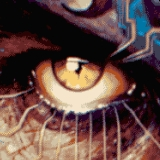I live my life as if I have unlimited free will, and I view the world as if everyone else is fully determined by their circumstances. And then I just ignore the contradiction. Ez pz
Best answer.
Also, specifically addressing your spoiler,
spoiler
Any quantum mechanical interpretation of the world (read: any valid interpretation of the world) finds that it is provably impossible to know the full initial conditions of any system, even a single particle, sufficiently enough to make any predictive model of it, soooo
It can still be deterministic I guess, just not knowably.
You react to choices the specific way you do because of experiences you’ve had previously.
Reverse time without changing anything, you’ll always make the same choices because you’re having the same thoughts each time every time, because you’ve been conditioned the way you are.
The universe doesn’t “know” where it’s going, but the plan is already in action. You can choose whatever you want to do, but if you were the same person in the same circumstance, you would and will always make the same decision.
I have the feeling most people cling to free will as a concept because not having free will raises questions if a “self” truly exists. However the existence of free will can be as scary if not more, since how could we define a “self” if it could freely do something not based on what defines it.
I think it’s more complicated than free will existing or not.
If you knew every single possible value about the universe at its start and had a perfectly accurate model of physics, you could theoretically predict/simulate everything that would ever happen. For practical reasons, though, that’s impossible, even ignoring weird quantum effects, for the simple reason that that is a lot of data points, more than any of us could reasonably keep track of- it’s like how, in sufficiently controlled conditions, a fair dice can roll the exact same number 100% of the time, but there are enough variables that are hard enough to control for in a normal situation that it’s basically random.
Similarly, if you knew everything about every human on Earth, you could theoretically predict exactly what any of them would do at any given moment. Of course, that’s just not practical- the body and brain are a machine that is constantly taking in input and adapting to it, so in order to perfectly predict someone’s thoughts and actions, you’d need to know every single detail of every single thing that has ever happened to them, no matter how small. Then, you’d need to account for the fact that they’re interacting with hundreds of other people, who are also constantly changing and adapting. It’s just not possible to predict or control a person for any reasonable length of time like that, because one tiny interaction could throw off the entire model.
Just look at current work with AI- our modern machine learning algorithms are much more well-understood and are trained in much more contained environments than any human mind, and yet we still need to manually reign them in and sift through the data to prevent them from going off the rails.
So, technically, I suppose free will doesn’t exist. For practical purposes, though, what we have is indistinguishable from free will, so there’s not much point getting riled up about it.
Indeterministic + free-will doesn’t exist and can’t exist. You literally end in impossible contradictions if you entail its existence in a consistent universe (as in, one where everything that exists is subjected to the same natural laws).
As a side note for OP, Hisenberg has proven there’s no such thing as “knowing the initial condition”.
The question is underspecified. Why do you want to know if free will exists? What will you do differently if it does exist vs if it does not exist?
This is similar to questions like, “is water wet?” You can generate endless debate on the topic, but it’s all intellectual masturbation until you are genuinely looking for the answer to a specific question.
No.
My brother and I have been having an ongoing debate about this and Simulation Theory for a good few years.
In my mind, it’s a pointless question to try and answer. It makes for a nice thought experiment, but actually having a belief in it is useless.
Well let’s start by examining the phrase “free will”
The term free has at least two different meanings in common language.
A) free as in beer ( free from cost) B) free as in speach (free from control)
Both of these could be broken down more (e.g. Monetary cost, entropic costs, mental cost and societal control, individual control, physical control… Etc)
Now, “will” is a bit more tricky. In this context we generally use it to mean “choice” However desire, and intention also get mentioned in the definitions.
- desire
- intention
- choice
When commonly discussed I would say people tend to talk about B3(the ability to choose without external physical control)
I would argue 3 requires 2 which requires 1
So now we discuss B1 - are we free to pick our desires.
This I find to be interesting. We often see people desiring things which seem foolish. Foolish as is Unwise. What makes something foolish? Seems to me foolishness is caused by a lack of data and poor modeling.
At this point my phone battery is at 6% So I’ll cut my response short. I see no truly free will. I think our desires can be shaped over time via our input (previous choices) however we can’t roll a die and pick our desires.
I don’t think this is a bad thing. Just maybe not ideal but what is in this world?
Hard determinist here. It doesn’t make the future predictable by me, but I don’t see how randomness could really occur. And then likewise there’s no such thing as free will.
Here is a good lecture from Robert Sapolsky on Human behavioral biology that will replace your question with more questions:
https://www.youtube.com/watch?v=NNnIGh9g6fANow see, if you’re looking at things from a biological point of view, it’s important to recognize the forest from the trees. A few trees are, well, just a few trees. But a great many trees together constitutes a forest, and becomes more than the sum of its parts. I feel the same way about the human brain. Yes, it’s a series of electrical and chemical impulses, but there are so many of these working in tandem that it becomes exponentially more complex, akin to ever-advancing computer technology. It’s complex enough that we think, we talk, we make decisions. And those decisions aren’t based solely on instinctional drive, and can even be made in opposition to them.
It’s true that human behavior can be accurately predicted based on an individual’s natural tendencies, but there are never any guarantees. There’s always a choice, a chance to veer off course. Decisions can be prudently made after careful research, or made on a frivolous impulse. Maybe you even realize that you would ordinarily take one action in a given situation, but do the exact opposite. You consciously chose to ignore your first impulse. If free will is an illusion, it’s a damned convincing one.
For me, I’ve always struggled with the definition of free will. Is there even a will to be free? The voice in my head is just a story “I” tell myself. So really, I’m just this conscious presence. I can observe thoughts that manifest within that presence. But those thoughts aren’t under my control. They’re just occurring.
I remember watching a video from Sam Harris years ago that really brought this to the forefront. Think of a movie. Any movie. What is it? Why did you pick that movie? Did you have conscious control over what movie you picked? Or did it just pop into your consciousness?
Either everything is purely deterministic, purely random, or something in between. But on that spectrum, there really isn’t room for free will. Simply the illusion of it.
Free will is way too vague of a concept, that it’s probably not worth pursuing the answer.
Superdeterministic and there’s no free will. There’s just things we don’t know and that maybe we will never know. So realism and non-locality for me. Also, holographic principle.







